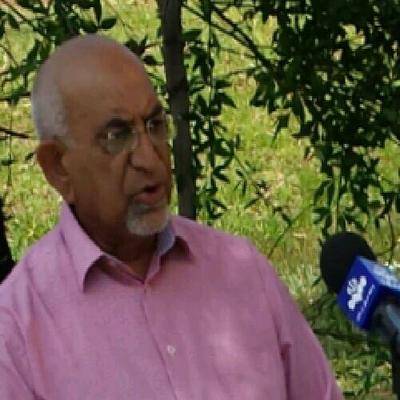Generations of Kashmir’s people have waited in vain for an end to India’s brutal military occupation and to celebrate their independence and freedom. Alas, seven decades have passed and the deeply-felt objective of standing proudly alongside free nations of the world remains as elusive as ever.
Seventy years of struggle for a free, independent and sovereign Kashmir have instead been marred by countless killings, massacres, rapes and wanton destruction. The story line is no different to that of other freedom campaigns, from South Africa to the ongoing struggle in Palestine. The occupiers are the villains and the occupied are the victims.
As was the case in South Africa’s epic battle against apartheid, the perpetrators of crimes against civilians, including war crimes, have been repressive state security institutions under the command of the executive. The Palestinians face a similarly horrendous situation where the occupying state — in their case a settler-colonial regime — remains engaged in what can only be described as a perpetual orgy of ethnic cleansing.
Kashmir and its people are on the receiving end of India’s military domination. On orders from the powers in Delhi, the Indian army has a single goal, to crush the dreams of Kashmiris at any cost. Thus we see the devastation of broken limbs and shattered dreams. And, tragically, zero accountability.
Indian Prime Minister Narendra Modi struts the global stage hoping that hobnobbing with the Trumps, Netanyahus and other right-wingers of this world will enhance his public image as a statesman. Unfortunately for him, his reputation as a warmonger precedes his current position as the leader of the world’s largest democracy.
Read: Modi’s historic visit reveals policy shift towards Israel
Following the 2002 Gujarat massacre, for which he is generally held complicit, Modi was placed on America’s terrorist list and barred from travelling there. The ban was lifted following his election as Prime Minister; overnight, both the US and the UN seemed to erase his deplorable human rights violations from both the record and their collective memory.
Modi has cultivated an aura of invincibility amongst his millions of followers. His leadership of the BJP, an extreme right-wing party, has placed him on a path to reclaim India as a Hindu nationalist state. This has, evidently, had a devastating impact on Kashmir.
The BJP regularly argues that the policies it pursues in the Occupied Kashmiri Territory are no different to those of the Indian Congress. In fact, to deflect criticism of their harsh crackdown, Modi and the BJP insist that they are maintaining the same security measures as that of the previous government. Indeed, they point to the historic dawn of independence from the British Empire in 1947 to justify the current militarisation with Indian troops in Kashmir.
Though there’s a huge gap between Modi and Jawaharlal Nehru, one of the leaders of the independence movement, many historians who have researched the issue of a plebiscite on Kashmir reveal how this fundamental pillar has been manipulated. Shockingly, Nehru has been fingered as devious having arrived at an agreement with Pakistan on a plebiscite in January 1949 and a ceasefire, merely “to buy time”.
Read: Netanyahu arrives in India, is greeted on tarmac by PM Modi
The following excerpt by AG Noorani, a renowned authority on Kashmir elucidates the situation: “Nehru had other plans. In private he had adamantly set his face against a plebiscite in 1947. In public, till 1954 he continued to make the most explicit – almost extravagant – and solemn pledge to hold a plebiscite. It was nearly fifty years later, in 1996, that the clue to Nehru’s entire Kashmir policy emerged, with the publication of Volume 22 of the Selected Works of Jawaharlal Nehru (SWJN)… Nehru wrote a secret note to Sheikh Abdullah, dated 25 August 1952, while camping at Sonamarg in Kashmir (SWJN Vol 22:32-30). It was one of the rare writings he authoured – cogent, comprehensive, unemotional, yet destructive in the ruthless course it foreshadowed. Its thesis was: (1) the people did not matter; (2) the UN was powerless; (3) so was Pakistan, as ‘we are superior to Pakistan in military and industrial power’, which would acquiesce while India professed friendship all along; (4) the accession must be rendered non-provisional, it must be made final; (5) Kashmir’s leaders must banish doubt for ‘doubts in the minds of leaders percolate to their followers and to the people generally.’ There must be no debate or argument in future; accession is an accomplished and final fact, and nothing is going to unsettle it (vide Document 5).”
Such double talk has characterised India’s record of non-compliance and deplorable subjugation of Kashmir. Modi may have excelled in brutality, but in enforcing his government’s will he has remained faithful to Nehru’s double standards.
It is admirable that, as in Palestine, the people of Kashmir have remained resolute in their determination to resist occupation. Kashmir is a breathtakingly beautiful mountainous area, with lush terrain. The land of Jammu, Muzafarabad, Gilgit, Baltistan and Ladakh borders Pakistan, Afghanistan, Xinjiang and parts of Tibet.
Just as Nehru assessed the geo-strategic importance of Kashmir, so too have all successive governments of India, including the current version led by Modi.
The views expressed in this article belong to the author and do not necessarily reflect the editorial policy of Middle East Monitor.


![Indian Prime Minister Narendra Modi [En.kremlin.ru]](https://i0.wp.com/www.middleeastmonitor.com/wp-content/uploads/2018/02/Indian-Prime-Minister-Narendra-ModicIF1rrFmyYkBR9SrfrXcpTB13ReEVNzr.jpg?fit=1200%2C800&ssl=1)









